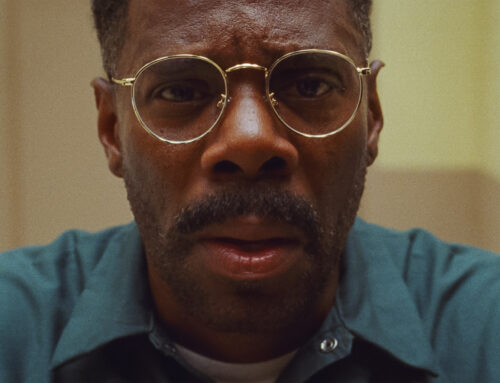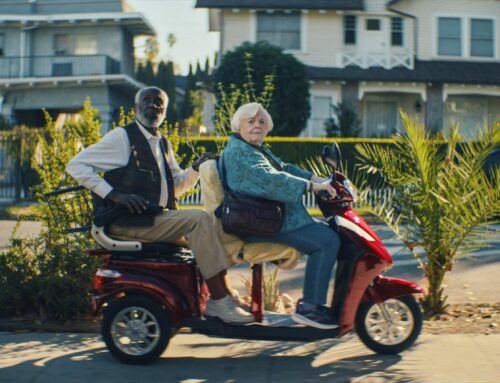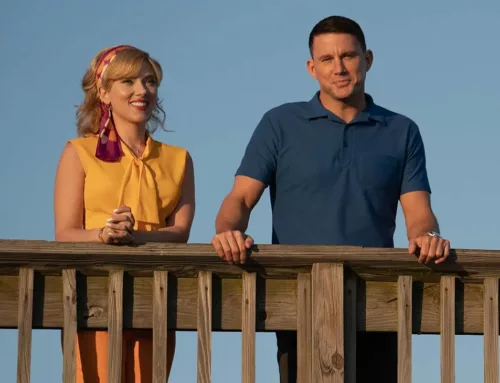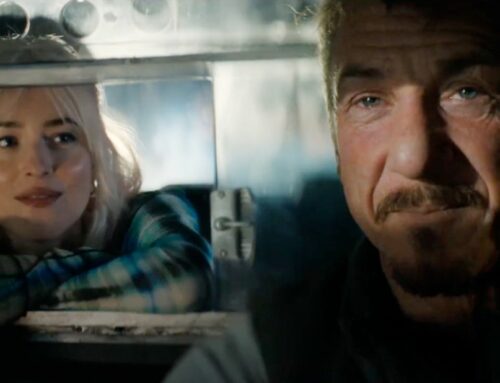What a dull summer at the movies. TOP GUN was a rousing entertainment– just what I wanted to kick off the season. But I was soon disappointed by Jordan Peele’s peculiarly flat horror-western-sci-fi mashup NOPE, despite a bunch of interesting ideas that never coalesced.
NOPE took us back to the beginnings of film, reframed racist Hollywood Westerns, and delivered rampaging aliens presaged by a chimp gone wild on the set of an early TV sitcom who makes mincemeat of his costars. Despite these flourishes, there was nary a scare to be had, nor a coherent tone, nor a consistent ensemble of performances– Keke Palmer overplayed, Daniel Kaluuya underplayed, and I left dispirited and scratching my head.
Since then I have been waiting for the fall movie season to catch fire. DON’T WORRY DARLING wasn’t the conflagration I’d hoped for–despite the rumored off-camera sparks: Did Harry Styles really spit on Chris Pine? Did Florence Pugh and Olivia Wilde really scream at each other on set? The film is directed by Wilde who also co-stars as a neighbor named Bunny, alongside singer Harry Styles (Wilde’s off-camera inamorata), and the talented Ms.Pugh. Styles and Pugh play Jack and Alice, a too-perfect newlywed couple, in a too-perfect neighborhood, in the middle of a desert, when Alice begins to sense something off. The cast can act, even Harry though he’s not called on to do much more than ravish his wife and dance up a storm in front of sinister head honcho (Chris Pine) and mastermind of this Stepford Wife-like experiment. There are many shiny objects to distract us–candy-colored 50’s get ups for the ladies while they dust their mid-century modern furniture and make martinis; for the men it’s the big-finned vintage cars they drive to the jobs they can’t talk about.
If only the film knew what to do with it all and perhaps dazzled us with some bold, interesting take in 2022. Nope. Wilde lets each scene run too long and Pugh’s hold on the camera takes us only so far. The script (Katie Silberman and Cary Van Dyke) lets her and us down–all build up, no pay off. The ending is rushed and unformed and raises more questions than it answers, among them what did Jack and Alice ever see in each other in the first place? As the film reaches an unsatisfying climax, there are yet more cutaways of black and white Busby Berkeley chorines, legs spread and moving, perhaps reminding us that women remain, to some extent, pretty props in a big glitzy production number directed by the men in their not so perfect little lives. Let’s move on…
But I just saw THE GOOD HOUSE. This small, intimate, imperfect movie is held together by an actress who has never been anybody’s prop: the towering, elegant Sigourney Weaver. In THE GOOD HOUSE, based on the novel by Ann Leary, Weaver plays Hildy Good a stalwart New Englander and top realtor in the fictional Massachusetts town of Wendover, with Canada standing in for Massachusetts’ rocky north shore. One of Hildy’s ancestors is even a Salem Witch. The film rounds up all the usual suspects when it comes to Massachusetts local color: boats and lobsters, crusty seamen and their wobbly “Bah-ston” accents, as well as some good New England actors among them– Georgia Lyman and Chris Everett well-known to Boston theater audiences. Kevin Kline delivers an uneven performance as Hildy’s disheveled, once-and-future boyfriend from high school with whom she’s reconnected.
Hildy’s problems at first appear to be financial; her business is threatened by a former employee who’s taken off with a few of Hildy’s prestigious clients and the attendant big commissions. Hildy’s ex-husband (David Rasche) has also left her for another man, and one of her daughters (Molly Brown) is leaning on her for financial support. These characters are marginally sketched at best and the movie feels thin and meanders for a bit. It’s Weaver who holds our attention in an utterly charismatic performance. She seamlessly moves in and out of the action, breaking away from the scene to address us and the camera directly, commenting on the history of the town, the people in it, and what a good realtor knows about the inhabitants of a house just by looking at its contents.
It’s her own real estate she’s in denial about. Hildy is an alcoholic. Weaver makes us feel the fleeting freedom from pain Hildy finds whenever she’s drinking; she makes lonely nights in her beautiful home polishing off a bottle or two of merlot hidden in the garage look like the most revelatory, luxurious experience. But we know what’s coming–the bleak morning after, the embarrassing blackouts, the near-death driving, and the embittered family Hildy’s leaving in her wake. This is a film that gets better and better, finding its way as Weaver and this smart non-preachy script continue to draw us inside the trauma of a woman who tries to make her drinking work, who believes drinking makes her more herself–until she almost loses herself and everyone’s belief in her. Yep. THE GOOD HOUSE is a movie worth hanging in there for.






Leave A Comment
You must be logged in to post a comment.